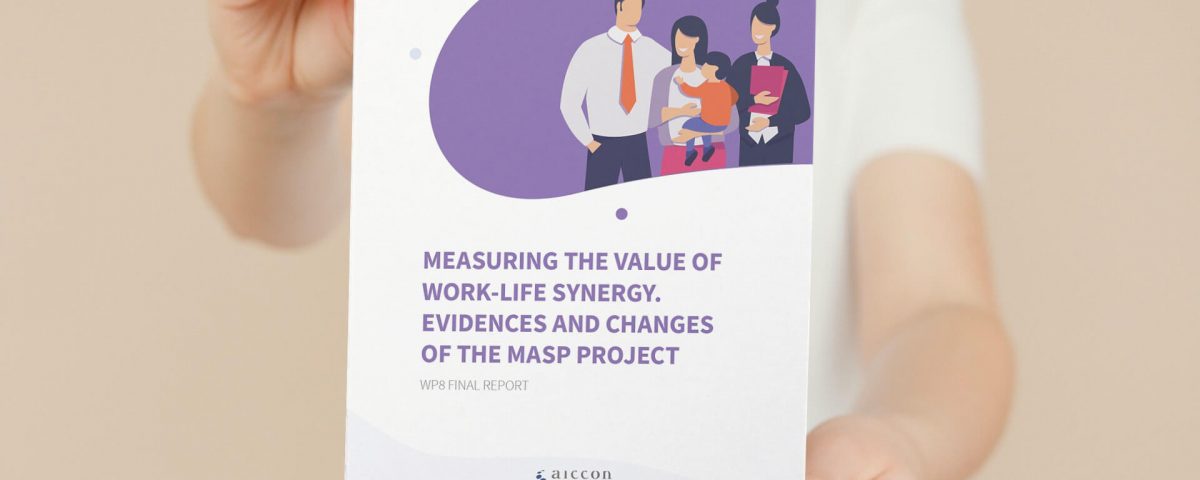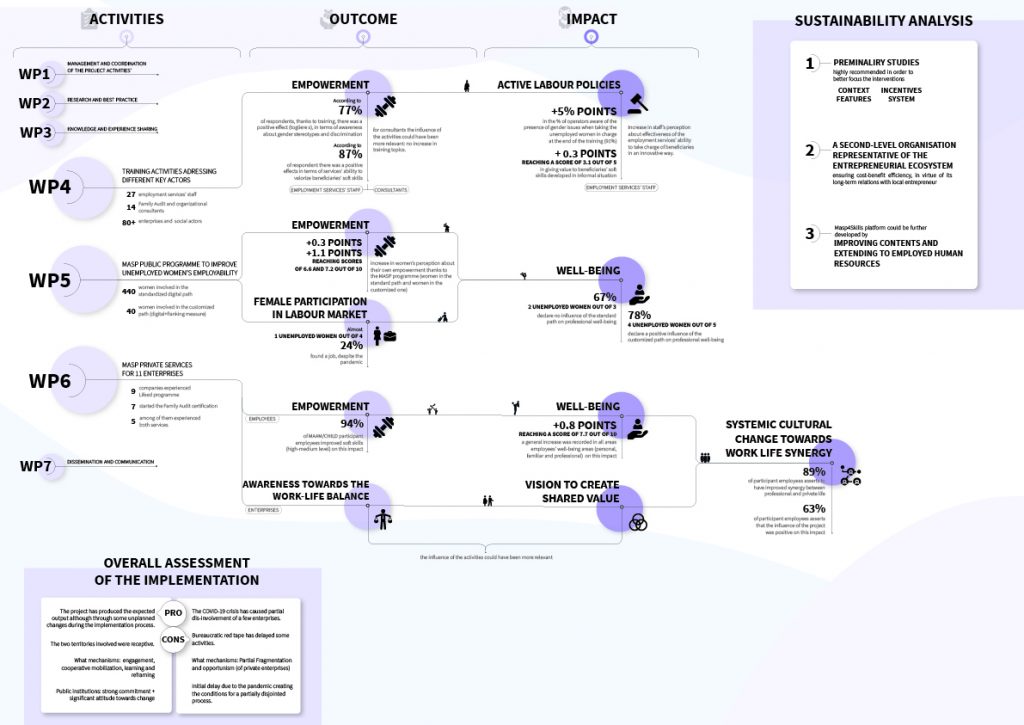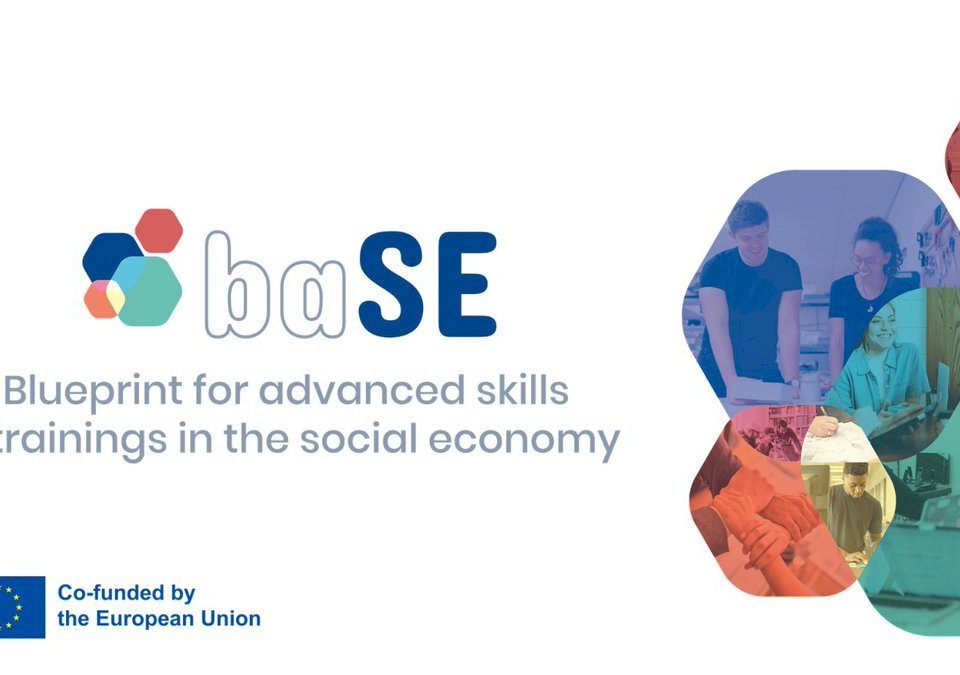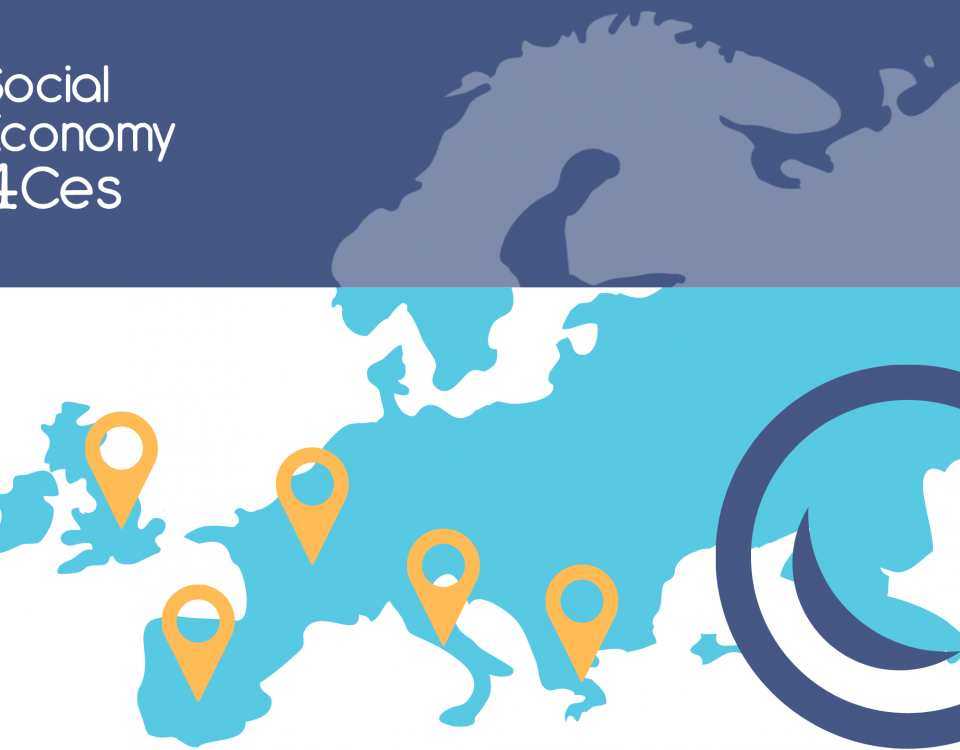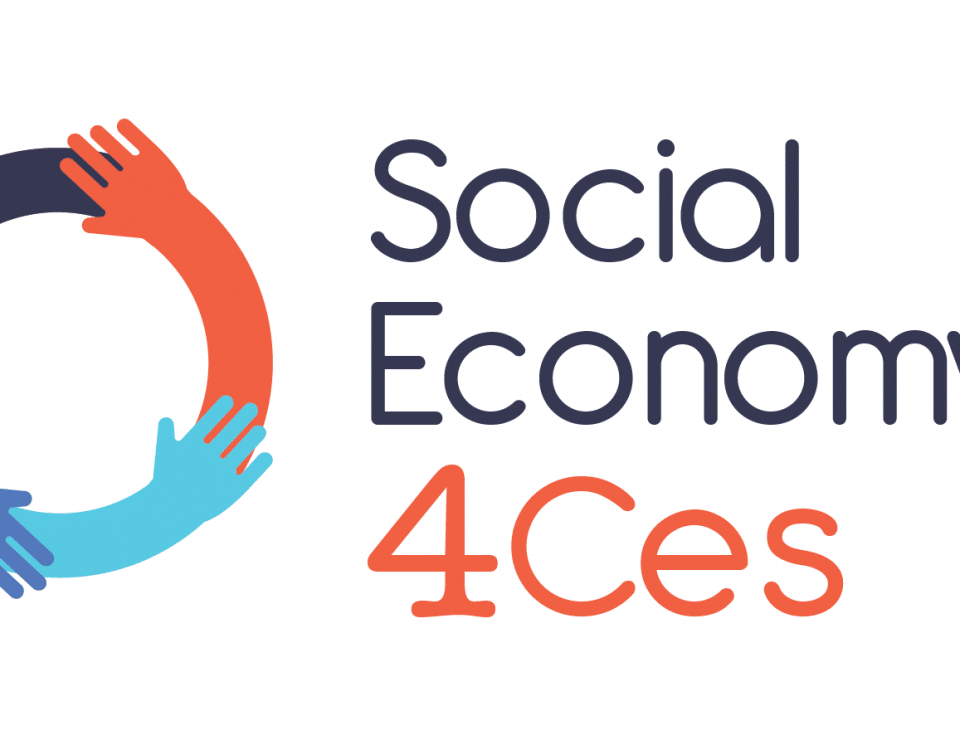
SE4Ces
24 March 2021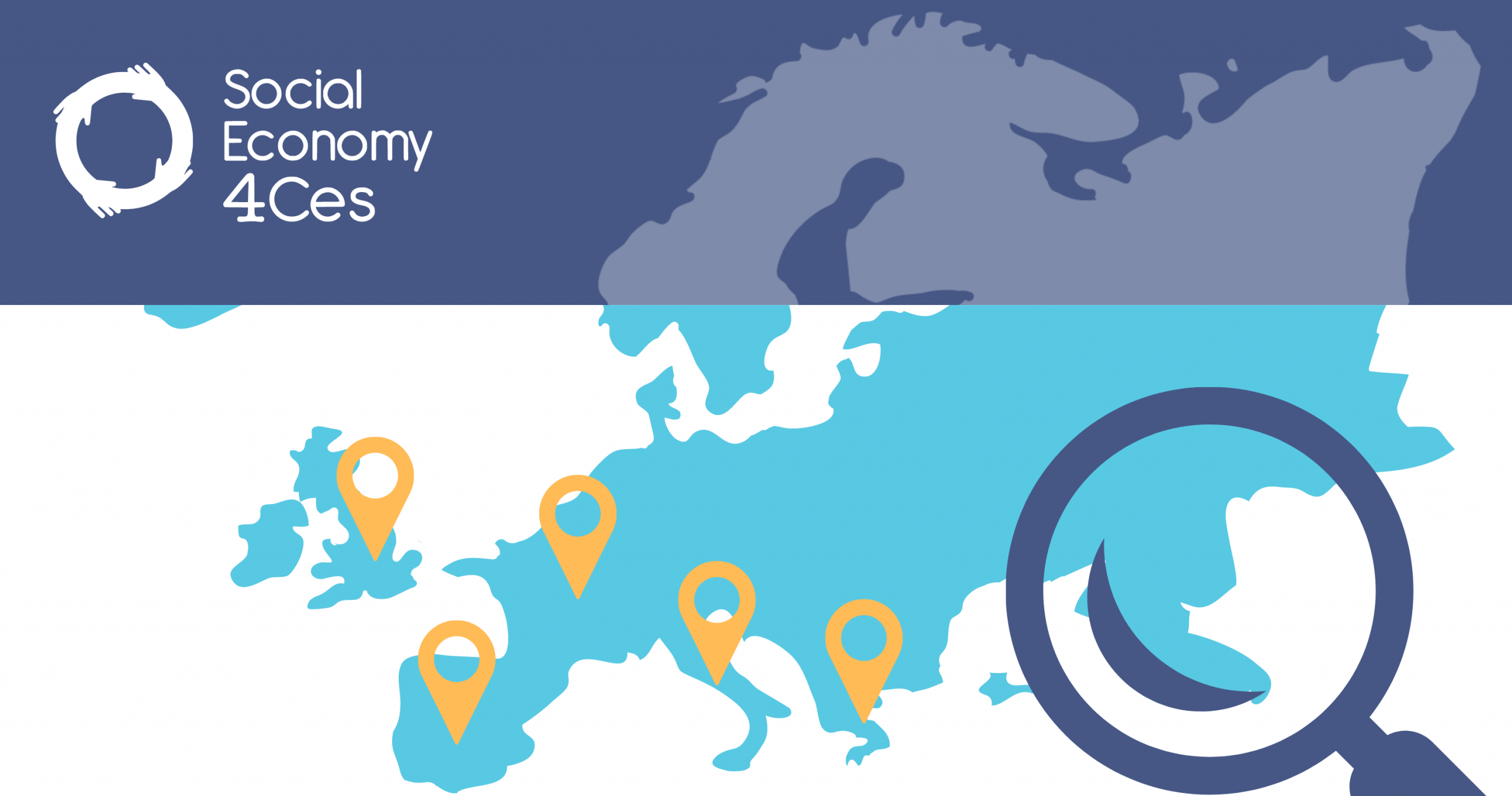
REPORT – Social Economy Education in Italy
10 November 2021MASP – Master parenting in work and life – is a project aimed to balancing work and private life, supporting an equal share of care responsibilities between women and men and encouraging a higher participation of women in the labour market. The main general goal is to change the perspective of work-life balance, moving to the concept of “work-life synergy”, highlighting the synergy between personal and working dimensions of individuals and the importance of the different roles of a person. In particular, MASP focuses on the following specific objectives:
- To develop and test an innovative work-life balance strategy focusing on two programmes: one dedicated to unemployed women; the second one targeting enterprises and their employees. The project will facilitate the access to the labour market for women with children up to 3 years and the return to the labour market of employed women with children up to 3 years. At the same time, MASPwill transform the parental experience in an opportunity to develop soft skills useful also for the professional career and incentivise the family-related leave for fathers.
- To improve capacities and knowledge of the key actors involved in the process of balancing of work and private life (companies and employers, public and employment services staff, management consultants) in order to make them aware of work-life synergy perspective and give them tools to implement MASPinnovative measures.
- Todevelop a sustainable multi-level partnership model in order to create an integrated urban policy in the territories participating in the project. The multi-stakeholder approach will facilitate the implementation of innovative work-life balance strategies in the workplace and in society as a whole.
- MASPwants to foster knowledge and experience sharing between different countries – in particular Norway- with a strong emphasis on the need to involve more men in care duties.
- Finally, the consortium wants to facilitate the access to information about social protection rights and entitlements.
The project will achieve its objectives by a pragmatic strategy, based on existing and already tested tools and on a participative approach, which means active involvement -at any stage – of all the relevant actors, either project partners or external stakeholders. The project focuses on two Italian territories, with different characteristics: the Municipality of Milan and the Autonomous Province of Trento.
The project considers two Italian best practices: MAAM and Family Audit. The MASP project develops a complex urban policy, which integrates the two experiences, improves them with other elements/activities and tests on different contexts.
The starting point of the project is the research phase (WP2). This activity aims to: a) identify and analyse the best practices of work-life balance strategies; b) analyse the results of the implementation of MAAM training programme and Family Audit within enterprises; c) analyse the specific needs of unemployed women of the testing territories. The project also fosters the knowledge and experience sharing between different Member States, in particular between Italy and Norway (WP3). The potential for mutual learning is a key component of the MASP project. While Norway is often held up as a model for gender equality, the country still faces challenges when it comes to ensuring work-life balance and that much can be learned from other countries. Particularly interesting is the co-production practices implemented in Italy between public authorities, for profit and non-profit organisations. Furthermore, the involvement of Reves Network ensures the active involvement of its network and, consequently, the knowledge experience across European Member States.
The second phase of the project starts with the development of training modules addressing different key actors (WP4), in order to make them aware of the work-life synergy approach and on the characteristics of MASP programmes. In particular, the activity targets: employers and social partners; management consultant and “family audit” consultant; public and employment services staff.
Finally, the project develops and test two innovative work-life balance activities addressing two different targets: unemployed pregnant women/new mothers (WP5); enterprises and their employees (WP6). Regarding the first target, the project developed the “MASP public programme for women” aimed at improving their employability. The programme focuses on 3 main activities: 1) development and testing of a digital training programme for pregnant women/unemployed mothers (CHILD); 2) development and testing of flanking measures for unemployed women; 3) realisation of parental kits. Concerning the second target audience, the project develops and tests the “MASP private services for enterprises“. This includes two main components: a) a digital training path for employed parents in big enterprises and SMEs; b) a process of audit of work-life balance measures.
Over the last few years, Social Impact (SI) evaluation and its use as a tool for improvement strategy has become increasingly important into the public action and debate. This trend is certainly not surprising if we consider its specific ability to give value to the transformation carried out by subjects within the contexts in which they operate. In this sense, given the transformative, ecosystemic and multidimensional nature of the concept of impact, it is even clearer why SI evalution is even more relevant for the the specific theme of Work Life synergy on which the MASP project focuses.
In the Work Package led by AICCON (WP8), an integrated analysis allowed to assess the transformative capacity of the project on the reference context (i.e. with respect to the different categories of subjects directly or indirectly involved). This strategy considers several observational levels and techniques. First of all a social impact assessment of the project activities was carried out. Secondly, the focus is placed on the analysis of the overall process (paragraph 2. Overall assessment through public policies’ lens and improvement strategy for future projects). The goal is to begin outlining some policy design tips and insights useful for public institutions and social actors active in promoting and supporting Work Life Balance (WLB) interventions. Specifically as stated in the document named “Feasibility study on impact evaluation of the MASP project”, it was not possible to implement the counterfactual approach as model of analysis of the effectiveness of the interventions dedicated to unemployed women. The analysis of qualitative aspects of the process allowed identifying improvement strategy for projects and policies addressing Work Life Balance theme and encouraging active and high quality participation by women in the labor market. Finally the sustainability analysis (§ 3) aims to understand if, how and which project actions (or parts of them) can be carried out in future time.
This publication has received financial support from the European Union Programme for Employment and Social Innovation “EaSI” (2014- 2020).
The information, documentation and figures in this document are under the sole responsibility of the author and do not necessarily reflect the views of the European Commission. The European Commission is not liable for any use that may be made of the information contained herein.
